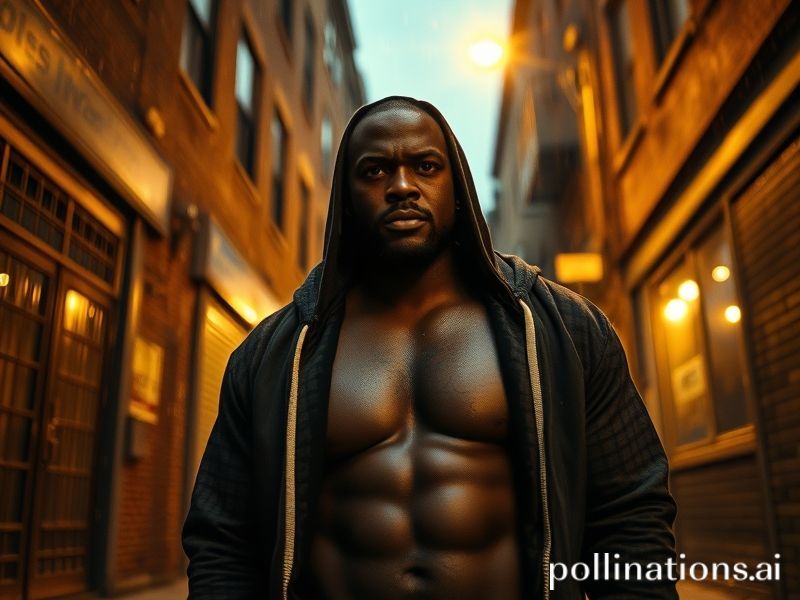Luke Cage Goes Global: How a Bulletproof Harlem Hero Became the World’s Favorite Political Fantasy
Harlem’s bulletproof baritone has done what most UN envoys only fantasize about: he’s become a one-man soft-power export. From Lagos barbershops to Seoul karaoke booths, Luke Cage—Marvel’s titanium-skinned ex-con turned reluctant folk hero—has transcended his Netflix zip code to become a global allegory for indestructible cool. The character, born in 1972 as a blaxploitation quick-buck afterthought, now moonlights as the planet’s most unlikely geopolitical Rorschach test. Bulletproof skin, it turns out, is the universal language of “try me.”
Consider the optics. In Johannesburg, where private security guards outnumber police five to one, bootleg “Sweet Xmas” T-shirts sell faster than Eskom can kill the lights. Brazilians streaming via VPN see a favela parable: a man the cops can’t shoot is basically a public utility. Meanwhile, French intellectuals—never missing a chance to overthink American pop—hold wine-soaked colloquia on Cage as post-colonial body armor. One Sorbonne adjunct recently argued the hoodie is the new keffiyeh. Tenure committees nodded so hard their turtlenecks nearly strangled them.
Netflix’s 2016 rollout strategy was a masterclass in accidental diplomacy. By dropping the series simultaneously in 190 countries, the platform weaponized binge culture into a form of cultural shock therapy. Overnight, subtitles translated “I’m about sick of always having to buy new clothes” into 27 languages, each interpreting bullet holes as either punch-line or political protest. The Chinese censors, true to form, trimmed scenes of police brutality, inadvertently turning Cage’s Harlem into a surreal utopia where cops politely request that suspects come along quietly. Viewership still spiked; nothing sells like a fantasy.
The merchandising numbers are equally absurd. In Manila, street stalls hawk unlicensed “repulsor-proof” durags. Moscow gyms sell “Power Man” kettlebells painted matte black, promising clientele the delusion that kettlebells are why oligarch bodyguards look intimidating. Even Switzerland—neutral since before neutrality was cool—has licensed a luxury watch with “unbreakable” sapphire crystal, retailing for the cost of a small coup. Somewhere, Carl Lucas is shaking his head at the irony: a man who rips car doors off for justice now sells Swiss timepieces to arms dealers.
But the real global resonance lies in the physics of the metaphor. Every nation has a demographic that identifies with being perpetually targeted and yet somehow still standing. Palestinians stream Cage while IDF drones buzz overhead; Ukrainians marathon it in Kyiv metro shelters; U.S. veterans watch from VA hospital beds, half amused that their morphine drip shares initials with the hero. The bulletproof Black man has become a blank slate onto which the world projects its own grievances, like a trauma Rorschach with better soundtrack licensing.
Of course, imperial powers have noticed. The Pentagon’s latest diversity slideshow name-drops Cage alongside Harriet Tubman, proof that even the military-industrial complex enjoys cosplaying woke. Meanwhile, China’s Ministry of Culture funds domestic superhero dramas featuring “socialist muscle,” but they can’t quite replicate Cage’s swagger—turns out bulletproof skin is easier to CGI than charisma. Russia tried too; their version, “Comrade Granite,” lasted one season before audiences realized watching a man shrug off vodka bottles lacked dramatic tension.
The grim punch-line? In a world where actual Black men are still disproportionately shot for holding cell phones, Luke Cage remains a profitable fantasy rather than policy proposal. Bulletproof TV can’t stop real bullets, but it does distract long enough to sell ad space. Perhaps that’s the ultimate international takeaway: we’ll pay to imagine invulnerability, but we won’t legislate it. Until then, Harlem’s stainless-steel savior keeps streaming in 4K, a comforting hallucination that somewhere, someone can walk through gunfire and emerge with nothing but a ripped shirt and a catchphrase.
Sweet Christmas, indeed. The receipts are bulletproof; the rest of us, tragically, are not.







